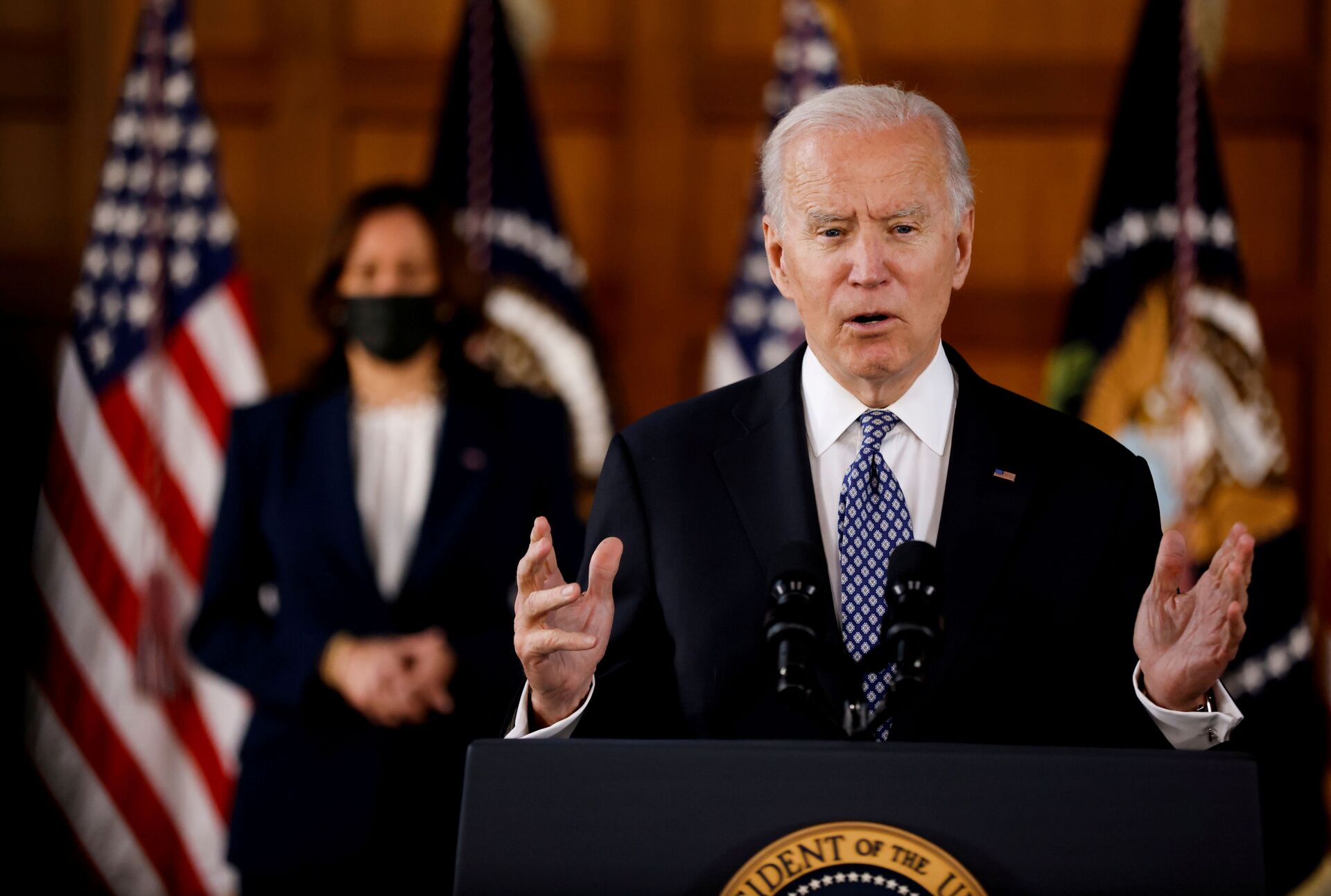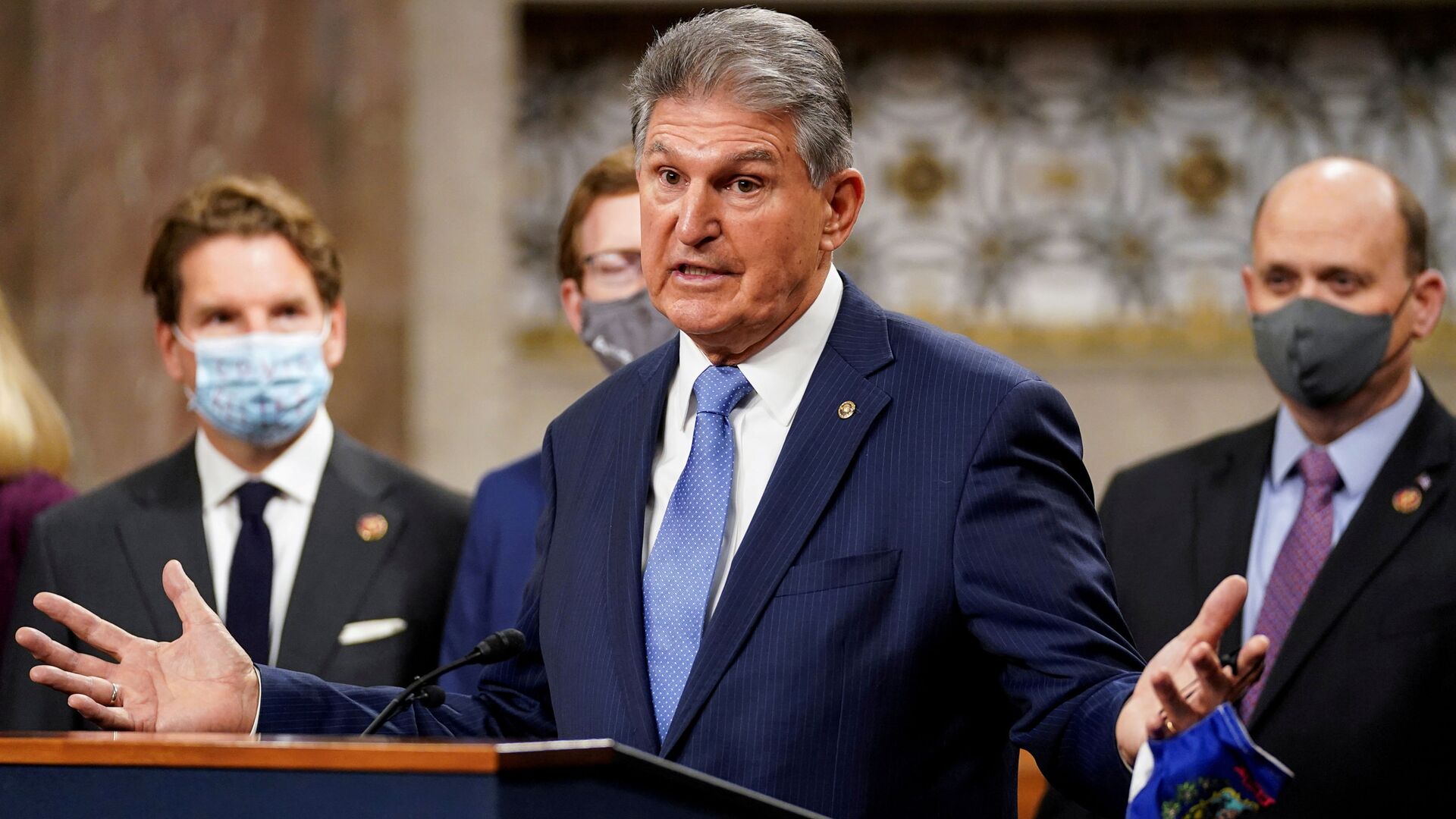Republicans and Democrats have crossed swords over the HR 1/S 1 bill which was passed by the House earlier this month and has been discussed in the upper chamber since 24 March.
The bill, commonly known as the For the People Act, has come under heavy criticism from the GOP that sees it as a federal government takeover of the US elections and "one-party power grab". In addition, the Republicans fear that HR 1/S 1 will leave the doors wide open for potential election fraud as it loosens voter verification rules, expands mail-in voting and legalises ballot harvesting nationally. The legislation was axed by GOP Senators in 2019 and reintroduced in January 2021 after the Democrats gained control in both chambers of the US Congress.
Still, Dems' majority in the US Senate is razor thin: the upper chamber is split evenly which means that they need every Democrat vote and the tie-breaker of Vice-President Kamala Harris. This circumstance has made Joe Manchin's vote extremely important.
HR 1/S 1: Dems' Major Voting Rights Bill
Though endorsing a number of the S 1 For the People Act's provisions, Democrat Senator Joe Manchin, former governor and secretary of the state of West Virginia, has indicated that the Dems' landmark bill will go "nowhere" without Republican support in the Senate.
Manchin releases statement on S. 1. pic.twitter.com/so0cWTFYXo
— Paul Blumenthal (@PaulBlu) March 25, 2021
"We must work toward a bipartisan solution that protects everyone’s right to vote, secures our elections from foreign interference and increases transparency in our campaign finance laws," Manchin said in a statement last week. "Pushing through legislation of this magnitude on a partisan basis may garner short-term benefits but will inevitably only exacerbate the distrust that millions of Americans harbor against the US government."
Democrats' H.R. 1 would leave elections more vulnerable to cheating, send taxpayer dollars to subsidize campaigns, and would turn the bipartisan Federal Election Commission into a Democrat-controlled partisan body.
— Leader McConnell (@LeaderMcConnell) March 24, 2021
It’s not about protecting voting. It’s about rigging the system. pic.twitter.com/POrUh2bq9H
Filibuster Might be Made More Painful But Can't be Removed
Meanwhile, the tie-breaking trick works only if the measure considered in the Senate can be passed by a simple majority of votes, in other cases Dems need at least 60 votes to prevent lawmakers from filibustering the initiative.
The filibuster is a political procedure where lawmakers can delay or block the vote on a proposed piece of legislation by extending debate on it. Democrats are considering eradicating the tool despite Senate Minority Leader Mitch McConnell warning that killing the filibuster will "release furies" the Dems "can barely imagine". For fairness' sake, though Democrats have branded the filibuster a Jim Crow relic, they used it 327 times in 2020, according to Fox News' John Roberts.
After @POTUS @JoeBiden denounced the rampant abuse of the filibuster last year, we did some digging. Republicans used it once. Democrats used it 327 times. @FoxNews
— John Roberts (@johnrobertsFox) March 26, 2021
However, the practice is unlikely to be killed since Manchin defended it saying that he would not be the 50th vote to nix it, much to his party colleagues displeasure. At the same time, he did not rule out making life "more painful" for those who resort to it.
No Reconciliation Tool if GOP Not Included in Discussion of $3 Trillion Bill
In addition to that, the senator is urging Democrat lawmakers to work together with the GOP on Joe Biden's "Build Back Better" $3 trillion to 4 trillion proposal. In early March, Manchin pledged to block the president's sweeping infrastructure and climate change proposal if Republicans weren't included. Previously, Democrats used a reconciliation tool to pass the $1.9 trillion COVID relief package in the Senate by a simple majority of votes along party lines. This time, Manchin said that he wouldn't vote for introducing reconciliation though supporting the infrastructure initiative as a whole.
"I'm not going to do it through reconciliation," the senator told Axios on 7 March. "I am not going to get on a bill that cuts them out completely before we start."
Meanwhile, the Republicans remain highly sceptical about Joe Biden's new spending plan and accompanying tax hikes saying that it won't get bipartisan support in the Senate.

Manchin: 'I Come From a Gun Culture'
On top of it all, Manchin does not support two gun control laws which were passed by the House this month. "No, I don't support what the House passed. Not at all," he told the press on 23 March. "I come from a gun culture. I'm a law-abiding gun owner."
The two House pieces of legislation, HR 8 and HR 1446, are aimed at closing loopholes in the background check system. Still, the bills raised concerns on the conservative part of the house with Republicans arguing that the proposals may hinder access to guns for law-abiding citizens whereas criminals are always capable of overcoming background check barriers.
In 2013, Manchin advocated a compromise bill that he developed together with Republican Senator for Pennsylvania, Pat Toomey. However, the legislation didn't pass. National Review's Charles CW Cooke explained that the Democrat senator's 2013 effort contained a provision that "directly contradicted the aims" of HR 1446 which is seeking to expand the time for the government's background checks.
In contrast, Manchin's bill would reduce "the amount of time a seller must wait for a response from the background check system before proceeding with a weapon sale, from three business days to 48 hours."
It appears that the Democrats did not expect such opposition within their ranks, National Review suggested on 26 March, citing an unnamed Senate Democrat who called Manchin "stubborn" and "the barrier to progress". Manchin's conduct is obviously unsettling for the left: last week MSNBC host Al Sharpton threatened to accuse the senator of "supporting racism" over the latter's unwillingness to nix the filibuster. Time will tell how this internal dissent will play out for the Democrats' ambitious plans.


